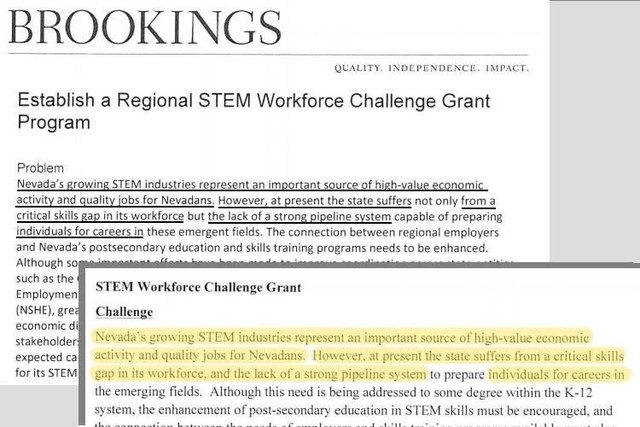Plagiarism allegations hound Nevada higher ed

Call it a tale of two cases of plagiarism within Nevada’s higher education system. And two is too many.
In one case, officials fired UNLV English professor Mustapha Marrouchi on Nov. 5.
But their action was taken only after a brutal expose by the Chronicle of Higher Education on Aug. 21 called “Anatomy of a Serial Plagiarism Charge.” That was followed Sept. 5 with a story carrying the headline “UNLV Professor Is Investigated For Career-Long Plagiarism.” Neither reflected well on him or UNLV.
Quoting sources, the September article said the UNLV investigation had ended in April. UNLV won’t discuss what disciplinary action was taken before the professor of postcolonial and multi-ethnic literature was fired.
UNLV’s investigation, using plagiarism detection software concluded he plagiarized 23 works without citing the source, according to Review-Journal reporter Francis McCabe.
In the world of academia plagiarizing 23 works without citing the source is not quite akin to serial rape, but it’s serious.
The Chronicle was much harsher and said Marrouchi had been accused at least 160 times of plagiarism during his career.
The Chronicle’s Brock Read wrote the UNLV professor has a diverse portfolio but a pattern emerges showing “Passages from other authors regularly appear, nearly verbatim, without attribution.”
In other words, if you cite another’s work, you’re OK. If you write it like it’s your own words, it’s not.
Marrouchi was hired in 2008, and the Chronicle detailed how he’d been accused of plagiarism as far back as his 1990 doctoral dissertation at University of Toronto.
It may have taken unfavorable publicity in a national education publication to get Marrouchi ousted, but this plethora of plagiarism finally received the action it deserved. Firing.
Now a second plagiarism situation made public by Review-Journal reporter Bethany Barnes is being disputed, but appears to be equally embarrassing to the Nevada System of Higher Education although thankfully doesn’t rise to the level of “serial plagiarism” by a professor.
In this case, the plagiarism accusations come from Brookings Mountain West, accusing the NSHE of lifting sections of a Brookings report draft. Basically, it pits a nonprofit think tank against a state agency.
Barnes wrote that documents showed Frank Woodbeck, executive director of the College Collaborative with the system, copied large sections of the Brookings draft report and submitted it to legislators as NSHE’s own proposal.
NSHE and Brookings are competing for a grant to establish a regional STEM Workforce Challenge Grant Program. STEM is shorthand for science, technology, engineering a math.
Brookings asked for $5 million, NSHE seeks $3.5 million. They each propose different agencies use the money, Brookings suggesting local redevelopment agencies decide who gets grants, NSHE suggesting a council of various agencies, including NSHE. The Legislature will decide which proposal is best — NSHE which lifted the Brookings ideas or Brookings.
Who is most believable?
Do you believe Dan Klaich, NSHE chancellor, who claims he had permission to use the Brookings draft?
Or do you believe Mark Muro, lead author of the report, who wrote Klaich in September saying he was “disconcerted this summer when that early sketch I had shared with you and DETR on a confidential basis turned up, without attribution, in the very public college governance commission deliberations and was adopted in that early form.”
Or do you believe Robert Lang, director of Brookings Mountain West, who estimated Brookings spent about $200,000 on the grant proposal and said he was shocked at NSHE’s use of Brookings’ work.
One person you don’t want to believe is Frank Woodbeck. He claimed he gave Brookings credit at the June 2 legislative hearing.
But Barnes did her due diligence and reviewed the video, before writing that Woodbeck never mentioned Brookings at that meeting. (Tip: Don’t dissemble about things that can be easily disproven.)
Plagiarism within a university and a higher education system reflect poorly on Nevada, which is desperately trying to improve its reputation on many fronts, including education.
Klaich should release the emails about this report. Brookings should do the same so a complete record is available. Then the Board of Regents should do their own due diligence.
In this day of email communications, the emails … and the documents themselves … tell the tales of plagiarism.
Jane Ann Morrison’s column appears Thursdays. Email her at jmorrison@reviewjournal.com or leave a message at 702-383-0275. Follow her on Twitter @janeannmorrison.